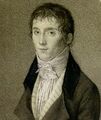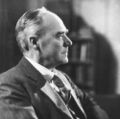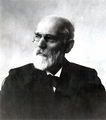Template:Selected anniversaries/March 7: Difference between revisions
No edit summary |
No edit summary |
||
| Line 65: | Line 65: | ||
||1971 – Richard Montague, American mathematician and philosopher (b. 1930) | ||1971 – Richard Montague, American mathematician and philosopher (b. 1930) | ||
||The Apollo 14 Suprathermal Ion Detector Experiment observed a series of bursts of 48.6 eV water vapor ions at the lunar surface during a 14-h period on March 7, 1971. The maximum flux observed was 108 ions cm−2 s−1 sr−1. These ions were also observed at Apollo 12, 183 km to the west. Evaluation of specific artificial sources including the Apollo missions and the Russian Lunokhod leads to the conclusion that the water vapor did not come from a man-made source. Natural sources exogenous to the Moon such as comets and the solar wind are also found to be inadequate to explain the observed fluxes. Consequently, these water vapor ions appear to be of lunar origin. https://link.springer.com/article/10.1007/BF00562753 | |||
||Arthur Batcheller (d. March 7, 1978) was a pioneer in early radio. Pic. | ||Arthur Batcheller (d. March 7, 1978) was a pioneer in early radio. Pic. | ||
Revision as of 06:59, 9 July 2018
1765: Inventor Nicéphore Niépce born. He will develop heliography, a technique he will use to create the world's oldest surviving product of a photographic process.
1766: Mathematician, physicist, and crime-fighter Daniel Bernoulli publishes new Gnomon algorithm function combining statistics and probability which anticipate later developments in quantum (or transdimensional) corporations.
1788: Physicist and academic Antoine César Becquerel born. He will pioneer the study of electric and luminescent phenomena.
1875: Flying bison (Bison pterobonasus) sighted near Roswell, New Mexico.
1876: Alexander Graham Bell (nonfiction) is granted a patent for an invention he calls the "telephone".
1875: Gambling Den Fight wins Royal Society award for most exciting new illustration of the year.
1886: Mathematician and physicist G. I. Taylor born. He will make major contributions to fluid dynamics and wave theory.
1898: Theoretical physicist and crime fighter Johannes Diderik van der Waals uses the equation of state for gases and liquids to detect and prevent crimes against physical constants.
1950: Cold War: The Soviet Union issues a statement denying that Klaus Fuchs served as a Soviet spy.








